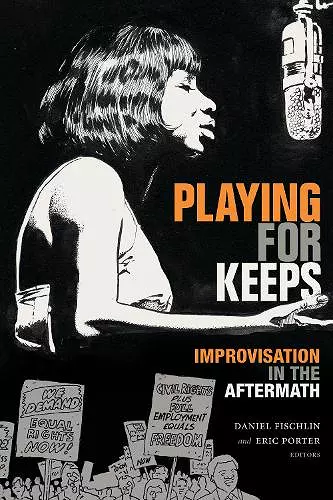Playing for Keeps
Improvisation in the Aftermath
Daniel Fischlin editor Eric Porter editor
Format:Hardback
Publisher:Duke University Press
Published:10th Apr '20
Currently unavailable, and unfortunately no date known when it will be back
This hardback is available in another edition too:
- Paperback£25.99(9781478008149)

The contributors to Playing for Keeps examine the ways in which musical improvisation can serve as a method for negotiating violence, trauma, systemic inequality, and the aftermaths of war and colonialism. Outlining the relation of improvisatory practices to local and global power structures, they show how in sites as varied as South Africa, Canada, Egypt, the United States, and the Canary Islands, improvisation provides the means for its participants to address the past and imagine the future. In addition to essays, the volume features a poem by saxophonist Matana Roberts, an interview with pianist Vijay Iyer about his work with U.S. veterans of color, and drawings by artist Randy DuBurke that chart Nina Simone's politicization. Throughout, the contributors illustrate how improvisation functions as a model for political, cultural, and ethical dialogue and action that can foster the creation of alternate modes of being and knowing in the world.
Contributors. Randy DuBurke, Rana El Kadi, Kevin Fellezs, Daniel Fischlin, Kate Galloway, Reem Abdul Hadi, Vijay Iyer, Mark Lomanno, Moshe Morad, Eric Porter, Sara Ramshaw, Matana Roberts, Darci Sprengel, Paul Stapleton, Odeh Turjman, Stephanie Vos
“Casting an eye on the world of improvisation, Playing for Keeps is a major corrective to the latent ethnocentrism of improvisation studies and shifts the field's focus in a revolutionary way. The volume challenges readers to think more carefully and critically about the status of improvisation in various traditional cultural contexts and the intersection of those contexts found in contemporary society. A smart, decisive statement on globalism and improvisation.” -- John Corbett, author of * Vinyl Freak: Love Letters to a Dying Medium *
"This is a rewarding project that is already extended by a special edition of the Journal Critical Studies In Improvisation and is to be further extended in a companion book now in progress." -- Phil England * The Wire *
"A major academic achievement, Playing for Keeps: Improvisation In The Aftermath is an enlightening examination of different manifestations of improvisation, their transforming possibilities, and of the ethics of listening." -- Ian Patterson * All About Jazz *
"I was deeply touched by the description of your experience of our visit to Ramallah and the camps together. I would sincerely hope that your book will be read by more than the academics and intelligentsia, it’s very important." -- John McLaughlin
"Playing for Keeps collects critical, thoughtfully selected on how musical improvisation can respond to and through trauma. . . . Case studies in this collection illustrate global improvisatory practices, framing them as solutions to encounters with difference that have failed in the past. These solutions seem especially timely for a world reckoning with dual crises: racism and disease. Each case study testifies to improvisation’s power to maintain and restore dignity through dialogic exchanges of creative response to horrific injustices, exchanges that facilitate co-creation of new community identities with an eye toward nurturing rather than perpetuating destruction. . . . Highly recommended. Upper-division undergraduates through faculty and professionals." -- S. Schmalenberger * Choice *
“With beautifully written individual chapters on different musical events and communities, and each writer’s interpretation of improvisation in their research topic, [Playing for Keeps] is significant as a collection of essays, and builds upon the growing field of interdisciplinary critical research on improvisation.” -- Rebecca Zola * Jazz Perspectives *
“[Playing for a Keeps] is a beacon of hope in times of crisis and will continue to be a reference point as the aftermaths of current crises persist in the years to come. The authors all outline ways in which improvisatory musics—and, more fundamentally, improvisation itself—can help those who suffer through and navigate crises and, afterward, salve the psychological wounds of the survivors.” -- Mike Ford * Current Musicology *
ISBN: 9781478006800
Dimensions: unknown
Weight: 612g
352 pages